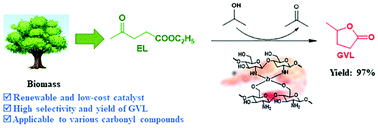MPV reduction of ethyl levulinate to γ-valerolactone by the biomass-derived chitosan-supported Zr catalyst†
Abstract
Herein, we used the biopolymer chitosan as a support to synthesize a biomass-derived catalyst (chitosan–Zr) to achieve GVL in 97% yield from MPV reduction of EL, by using isopropanol as a hydrogen source. The catalyst system is also applicable to the reduction of various organic compounds with carbonyl groups. Additionally, we have proposed a possible mechanism for this reaction based on the systematic investigation towards the reaction. Moreover, the recycle and reuse experiment showed that this chitosan–Zr exhibited long-life catalytic performance and can maintain its high catalytic performance even after five runs of recycle and reuse experiments.



 Please wait while we load your content...
Please wait while we load your content...